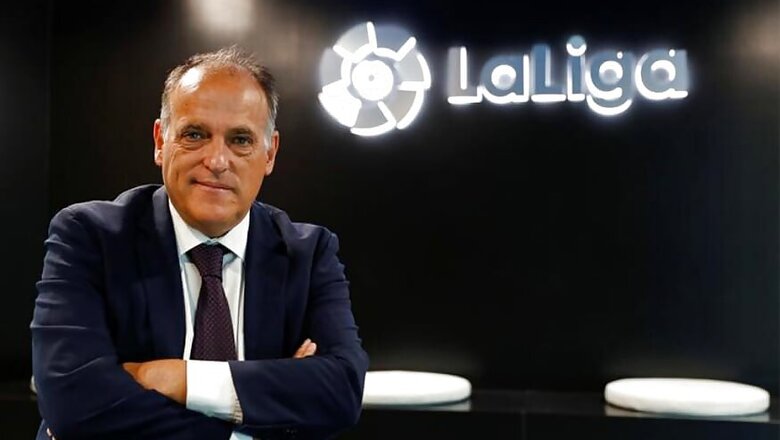
views
London: In European football's relentless search for growth and new revenues, Spain's La Liga has been among the most aggressive of the continent's top leagues.
Under a plan hatched and pressed by its chief executive, Javier Tebas, La Liga has planted its flag across the globe, opening offices in far-flung cities - not just obvious markets like New York and China, but also in Belgium and Singapore and South Africa, among others - in a bid to scoop up new fans and television and sponsorship dollars.
Tebas has even gone to court in the United States in an effort to hold a league game outside Spain. But there is one red line Tebas said that he is unwilling to cross: La Liga and its teams should not, he argued, be playing matches in Saudi Arabia.
To Tebas, the kingdom, despite its high-profile campaign to rebrand itself as a modern and tolerant society led by a youthful crown prince, should not be permitted to use international sporting events to mask its record of human rights abuses.
"The Saudi Arabian government has a policy whereby they improve the image of the government through sport, whitewashing their image, and we all have a responsibility there," Tebas told reporters last week in London, where he unveiled the league's latest overseas venture, a new British television channel dedicated to La Liga.
So he could only watch with impotent fury earlier this month when the country's four biggest teams - Real Madrid, Barcelona, Atlético Madrid and Valencia - decamped to Saudi Arabia for the annual Spanish Super Cup. There was nothing Tebas could do to stop the games; the league plays no role in them.
Instead, the Spanish football federation runs the competition, and it had struck a three-year deal with Saudi authorities worth 120 million euros ($133 million) to turn what was once a one-game event into a four-team tournament, and to crown its champion in the kingdom.
The federation, he said, had simply followed the trail of new money, and had brought the teams along for the ride.
"The bottom line is football has become a business and as a business it looks for income," Barcelona's since-fired coach, Ernesto Valverde, had said upon arriving in Riyadh for the semifinals. "That's the reason we are all here."
To Tebas, however, Spain's football federation had allowed itself and La Liga's biggest teams to be used in what he labeled reputation laundering. The games, he noted, were played barely a year after operatives from Saudi Arabia flew to Istanbul and, according to Turkish officials, brutally murdered a dissident journalist, Jamal Khashoggi, inside the Saudi embassy there.
"We should not forget what happened," Tebas said.
"This is very serious,'' he added. "Money is not the only thing that matters."
Few Spanish fans traveled to the games, and the Spanish broadcaster that routinely had broadcast the game in previous years declined to do so this year, citing concerns over human rights in Saudi Arabia.
The president of Spain's football federation, Luis Rubiales, defended the decision to play the games in the country, describing the tournament "as a tool of social change" because men and women would be permitted to sit side by side, in a country where women's rights are restricted. Saudi Arabia first allowed women to enter football stadiums in 2018, but in the past men and women were segregated at matches.
And the football matches had ample precedents. In recent years, Saudi riches have lured in not only other football games, but title fights in professional boxing, auto races, tennis matches and even WWE events. There is even a multiyear arrangement with snooker's governing body.
Tebas' anger at the Spanish federation's agreement with Saudi Arabia was financial, too. He has been among the most-outspoken sports executives protesting the continued presence in Saudi Arabia of what has been called the largest and most sophisticated broadcast piracy operation in the world.
A series of independent studies have concluded that a Saudi-based channel named BeoutQ has been stealing and airing lucrative sports properties, including La Liga games, whose rights are owned by Qatar-based beIN Sports.
As Saudi Arabia continues to deny that it is hosting the network, despite mounting evidence to the contrary, organizations like La Liga and England's Premier League and even football governing bodies like UEFA and FIFA have found tackling the issue almost impossible, mainly because lawyers in Saudi Arabia have refused to take them on as clients.
"They were pirating the signal and there were institutions linked to the actual government," Tebas said of Saudi Arabian broadcasters. "They are still favoring actions that go against our property. And the wealth we are generating, we cannot have that wealth going there."
Complicating matters further for Tebas are business moves in Spain's second division, which he also oversees as La Liga's chief executive, by Turki al-Sheikh, a key confidant of the de facto Saudi leader, Crown Prince Mohammed bin Salman, and a member of the government. Sheikh last summer acquired the Andalusian team Almeria and since then has bankrolled a program to overhaul the team in a bid to win promotion to the first division, where it could compete against the likes of Real Madrid, Barcelona and Spain's other biggest clubs.
By applying strict regulations on Almeria, and preventing it from spending beyond league-enforced cost controls, Tebas said La Liga was trying to "avoid what PSG and Manchester City are doing."
Mohamed El-Assy, an Egyptian installed as Almeria's general director, said that despite its owner's status in Saudi Arabia, the team had no connection with the state, and that despite a wholesale recruitment program, the team's spending was not even the largest in the second division. "What we spend is less than one player at Man City or PSG," he said.
Tariq Panja c.2020 The New York Times Company


















Comments
0 comment